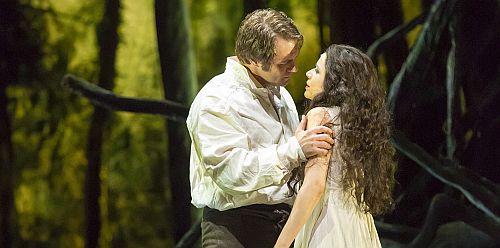 United States Dvořák, Rusalka: Soloists, Lyric Opera of Chicago, Sir Andrew Davis, (conductor), Civic Opera House, Chicago. 22.2.2014 (JLZ)
United States Dvořák, Rusalka: Soloists, Lyric Opera of Chicago, Sir Andrew Davis, (conductor), Civic Opera House, Chicago. 22.2.2014 (JLZ)

Cast
Rusalka: Ana María Martínez
Prince: Brandon Jovanovich
Ježibaba: Jill Grove
Vodnik: Eric Owens
Foreign Princess: Ekaterina Gubanova
1st Wood Nymph: Lauren Snouffer
2nd Wood Nymph: J’nai Bridges
3rd Wood Nymph: Cynthia Hanna
Kitchen Boy: Daniela Mack
Gamekeeper: Philip Horst
Hunter: Anthony Clark Evans
Production
Conductor: Sir Andrew Davis
Director: Sir David McVicar
Set Designer: John Macfarlane
Costume Designer: Moritz Junge
Lighting Designer: David Finn
Chorus Master: Michael Black
Choreographer: Andrew George
Lyric Opera of Chicago’s new production of Dvořák’s Rusalka has the vividness of film, with a realistic depiction of the woods and detailed sets for the castle scene plunging the audience into the opera’s world of the late-nineteenth century. Costumes and accoutrements echo that period—Dvořák’s time—with the opulence of the human world contrasting with the primeval forest of the magical one. The colors are vivid throughout, and at least in one intimate scene in a kitchen, the details that made the scene come alive elicited audience applause.
In the title role Ana Maria Martinez shows exceptional command of the role. The familiar “Song to the Moon” (“Měsičku na nebi hlubokém”) from the first act was touching, with Martinez displaying remarkable phrasing instincts and control of dynamics, but also showing the sheer richness of her voice. The second-act soliloquy “O marno te je” was appropriately dramatic, and she was equally moving in “Necitelná vodni moci,” which begins the third act. Her delicacy contributed to make a powerful effect. The intensity continued through the final scene, a duet with the Prince in which Rusalka gives him the kiss he desires and with it, facilitates his death and her own demise. The tragic ending resonated with the love death of Wagner’s Tristan und Isolde yet with the dimensions Rusalka sacrificed herself as a measure of her love.
As the Prince, Brandon Jovanovich gave an intensely passionate and musically engaging performance. His lively, precise tenor was evident from his opening aria “Vidino divná přesladká,” and he exuded ardor, while executing the rhythms in exemplary style. The passion that he showed in the first act become even more heightened in the third, particularly in his duet with Rusalka, “Miláčkus, znáš mne, znáš?”, in which the Prince begs her forgiveness. Jovanovich matched the nuances of Martinez, and the two of them were touching and powerful.
Jill Grove’s Ježibaba was a three-dimensional depiction of this iconic witch. While the menacing aspects of Ježibaba are well known, Grove rounded out the characterization with good humor and excellent delivery. Her famous scene in the first act (“Čury mury fuk”) had both conjuring and plenty of drama. She became even more menacing in the complementary scene in the third act, which she does not merely administer another potion to set things right, but asks Rusalka to take the blood of the Prince. Groves gave this scene the depth it deserves, with an impassioned tone and firm sense of pitch.
Eric Owens gave a richly delineated portrayal of Vodnik the water goblin. His deep bass-baritone clearly articulated the role with a lovely tone, plus impeccable clarity and musical acuity. The rest of the cast were strong all around, with the role of the Foreign Princess notable for the ways in which Ekaterina Gubanova made her limited time on stage quite memorable. The Kitchen Boy was sung by the young soprano Daniela Mack, who was perfect for this production. The wood nymphs—Lauren Snouffer, J’nai Bridges and Cynthia Hanna—were similarly strong.
Rusalka was given with minimal cuts, and with stylishly choreographed dance sequences. In addition to the fine staging, conductor Sir Andrew Davis gave a focused reading of the score, and the Lyric’s orchestra filled the Civic Opera House with a warm, supportive tone. If at times the brass were over-enthusiastic, Davis adjusted the balance, while maintaining the instrumental focus in each act; Dvořák’s careful scoring receiving an idiomatic reading in Davis’s hands. The evocation of the “Tristan chord” in the third act was nicely played, with the conductor lingering on the sonority just long enough to call attention to it.
James L. Zychowicz